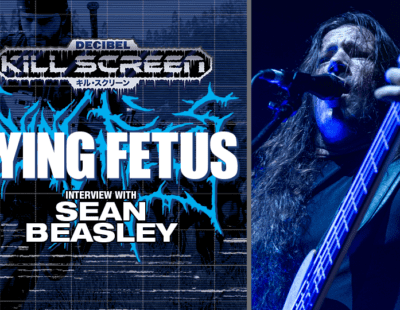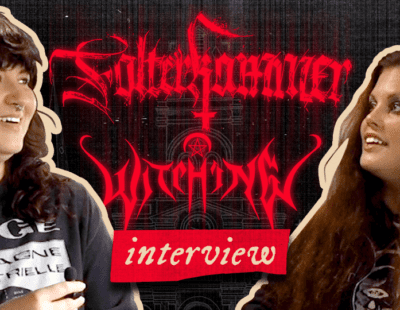
Italian death dealers Hideous Divinity released their third album, Adviens, via Unique Leader earlier this year. It was a fine addition to a year rich in exceptional releases, and continues Hideous Divinity’s upward trajectory. Guitarist and band mastermind Enrico Schettino took a moment to chat with Decibel about Adviens, technical death metal and the almighty Immolation.
Adveniens came out earlier this year. What has the reception to the album been like thus far? Has the album had the impact or effect with listeners you had hoped?
Reception was truly beyond our expectations. We were not sure about how the usual death metal aficionados would react to our more obscure, black-ish solutions, so it was great to notice that the more”experimental” tracks obtained the most positive outcome. So yes, that was exactly what we hoped. It showed us this new direction was the right one, and gave us very good hints for the future.
2017 also marks the 10-year point of Hideous Divinity’s existence. What has changed for the band in that time, and have you achieved the goals you had set (if any) when the band began?
It’s always good to remind that there was no “physical” lineup until late 2010… I really believe that, since then, the band achieved a lot even with all those problems one has to expect when playing death metal. Every song is like a guitar maze, every rehearsal is like a squat session, every concert turnout is a guessing game… can you endure it if you’re really not into it? I look back and see 3 albums, one very different from each other, endless tours and festivals, but most of all I see the will to progress, to struggle to do something different every time rather than copy and paste 300 BPM riffs and blasts.
Have you been playing these new songs live? Have any become fan favorites?
We play almost the entire album live now, it took us a lot of work in the rehearsal room to perform these songs in a way so people would not say “This song is much better on the CD… you cheaters!” Reactions during the European tour with Cattle Decapitation and Broken Hope have been amazing. I’d say that “Messianica” has that kind of “train off the rails” start that always has a great response live.
What is the Hideous Divinity songwriting process like? You manage to write intense death metal that occasionally employs flashy, technical work (like the solo in “Sub Specie Aeteritatis”). How do you balance technicality with writing songs that will stick with people?
Thanks for that (also from Giovanni’s side, he’s got the paternity of that guitar solo and pretty much every decent solo on the record [laughs]). Balance is everything, true story. I believe the trick is that I never considered myself a technical guitar player, nor my music what everybody likes to define “technical death metal.” I’d leave that to bands like Archspire or Obscura: awesome musicians like I could not be in a million years, but not my cup of tea. Quoting Mr. Dallas Toler Wade, “it’s more about the riff and less about the tech.” I concentrate on the riff and the song structure, I always try to come up with an entire structure when presenting new material to the rest of the band rather than just a bunch of ideas thrown there just to see what happens. I’m always afraid of what we could call “Babel Tower effect,” if you get what I mean.
Decibel dubbed 2017 the “year of death metal,” with an extensive list of both younger and veteran bands releasing killer death metal records. What have you been listening to this year?
Yep, we choose the worst year for a new release. So much competition! I’d say that quantity doesn’t always mean quality though. Some releases have been great, some others a bit disappointing. The new Immolation remains out of reach. Look for “personality” on the dictionary… you’ll find a picture of Immolation there. At the moment I’m totally hooked on the new Arkhon Infaustus: what’s with France and evil bands?
As I understand, Hideous Divinity albums are written with a concept or theme in mind. What was the theme for Adveniens?
The album concept is a violent reflection on art, on the prophetic role of the artist, and on the innovative power of violence able to change language. It revolves around a philosophical/literary pillar given by the work and reflections of Walter Benjamin about art in the age of mechanical reproduction, and mostly, about his messianic vision of history. The other pillar is, again, cinematographic: the David Cronenberg movie Videodrome. Not that much regarding the gory visual aspects of the “new flesh,” but rather regarding the movie’s reflection on the “videocircus,” the torture chamber where we get accustomed to violence. 1983… and Cronenberg had it all figured out already, talking about “prophets,” huh?






